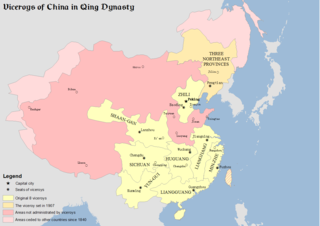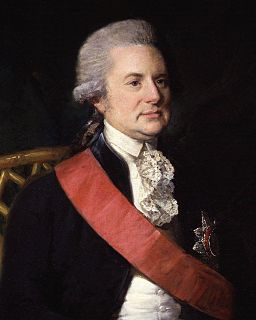
The Qing dynasty, officially the Great Qing, was the last imperial dynasty of China. It was established in 1636, and ruled China proper from 1644 to 1912. It was preceded by the Ming dynasty and succeeded by the Republic of China. The Qing multi-cultural empire lasted for almost three centuries and formed the territorial base for modern China. It was the fifth largest empire in world history. The dynasty was founded by the Manchu Aisin Gioro clan in Manchuria. In the late sixteenth century, Nurhaci, originally a Ming Jianzhou Guard vassal, began organizing "Banners", military-social units that included Manchu, Han, and Mongol elements. Nurhaci formed the Manchu clans into a unified entity. By 1636, his son Hong Taiji began driving Ming forces out of the Liaodong Peninsula and declared a new dynasty, the Qing.

The Qianlong Emperor was the sixth emperor of the Manchu-led Qing dynasty, and the fourth Qing emperor to rule over China proper. Born Hongli, the fourth son of the Yongzheng Emperor, he reigned officially from 11 October 1735 to 8 February 1796. On 8 February, he abdicated in favour of his son, the Jiaqing Emperor—a filial act in order not to reign longer than his grandfather, the illustrious Kangxi Emperor. Despite his retirement, however, he retained ultimate power as the Emperor Emeritus until his death in 1799; he thus was one of the longest-reigning de facto rulers in the history of the world, and dying at the age of 87, one of the longest-lived. As a capable and cultured ruler inheriting a thriving empire, during his long reign the Qing Empire reached its most splendid and prosperous era, boasting a large population and economy. As a military leader, he led military campaigns expanding the dynastic territory to the largest extent by conquering and sometimes destroying Central Asian kingdoms. This turned around in his late years: the Qing empire began to decline with corruption and wastefulness in his court and a stagnating civil society.
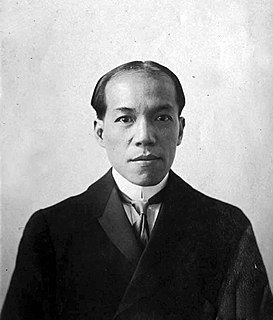
Liang Qichao, courtesy name Zhuoru, art name Rengong, was a Chinese scholar, journalist, philosopher, and reformist who lived during the late Qing dynasty and the early Republic of China. He inspired Chinese scholars with his writings and reform movements.

Sir George Leonard Staunton, 1st Baronet was an employee of the East India Company and a botanist.

Liang Sicheng was a Chinese architect and scholar, often known as the father of modern Chinese architecture. His father, Liang Qichao, was one of the most prominent Chinese scholars of the early 20th century. His wife was the architect and poet Lin Huiyin. His younger brother, Liang Siyong, was one of China's first archaeologists.
Sir George Macartney was the British consul-general in Kashgar at the end of the 19th century. He was succeeded by Percy T. Etherton. Macartney arrived in Xinjiang in 1890 as interpreter for the Younghusband expedition. He remained there until 1918. Macartney first proposed the Macartney-MacDonald Line as the boundary between China and India in Aksai Chin.

Admiral Sir Erasmus Gower was a Welsh naval officer and colonial governor.
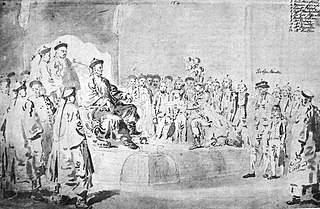
The Macartney Embassy, also called the Macartney Mission, was the first British diplomatic mission to China, which took place in 1793. It is named for its leader, George Macartney, Great Britain's first envoy to China. The goals of the mission included the opening of new ports for British trade in China, the establishment of a permanent embassy in Beijing, the cession of a small island for British use along China's coast, and the relaxation of trade restrictions on British merchants in Guangzhou (Canton). Macartney's delegation met with the Qianlong Emperor, who rejected all of the British requests. Although the mission failed to achieve its official objectives, it was later noted for the extensive cultural, political, and geographical observations its participants recorded in China and brought back to Europe.
Wat Ngong (1785–1867), also known by various other names, was a Chinese Protestant convert, evangelist, and writer from Guangzhou during the Qing dynasty. He was an early lithographer in Malacca, Macao, Guangzhou, and Hong Kong, possibly the first Chinese to master the craft.
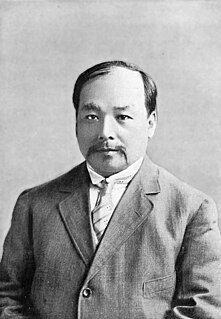
Liang Shiyi was a Chinese minister who served as premier of China during the Beiyang government from 1921 to 1922.
Cai Qian (1761–1809) was a Chinese sea merchant, considered by some a pirate during the Qing Dynasty era.

Sir Samuel Halliday Macartney (1833–1906) was a military surgeon and later a diplomat serving the Chinese government during the late Qing dynasty.
The Immobile Empire is the English translation of L'empire Immobile, Ou, Le Choc Des Mondes: Récit Historique, a book of history published in French 1989 by the French politician and writer Alain Peyrefitte and translated into English in 1992. The book gives a sweeping narrative of the British Embassy of Sir George Macartney to the Qianlong Emperor of China in 1793. Published originally in French, the book was then translated into English, Chinese, Dutch, and Portuguese. Peyrefitte contends that the frustration of the mission and the stand off in relations between Great Britain and China over diplomatic and audience ritual was caused by the ignorant intransigence and cultural conceit of the imperial court. The empire was "immobile" because these attitudes stifled China's natural creativity and kept it bureaucratic, static, and feeble over the following century and a half.

The Macartney–MacDonald Line is a proposed boundary in the disputed area of Aksai Chin. It was proposed by British Indian Government to China in 1899 via its envoy to China, Sir Claude MacDonald. The Chinese Government never gave any response to the proposal. Subsequently, the British Indian Government is said to have expanded their claims to the Johnson Line, which was a boundary previously rejected by the British Indian government.
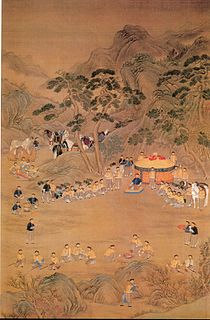
The imperial hunt of the Qing dynasty was an annual rite of the emperors of China during the Qing dynasty (1644–1911). It was first organized in 1681 by the Kangxi Emperor at the imperial hunting grounds at Mulan (modern-day Weichang Manchu and Mongol Autonomous County, near what would become the summer residence of the Qing emperors at Chengde. Starting in 1683 the event was held annually at Mulan during the autumn, lasting up to a month. The Qing dynasty hunt was a synthesis of earlier Chinese and Inner Asian hunting traditions, particularly those of the Manchus and Mongols. The emperor himself participated in the hunt, along with thousands of soldiers, imperial family members, and government officials.

Liang Cheng, courtesy name Liang Chentung, also known as Liang Pi Yuk and later as Chentung Liang Cheng, was a Chinese ambassador to the United States during the Qing dynasty. He was primarily responsible for negotiating the return payment by the US of its share of the Boxer Indemnity for the establishment of Tsinghua University and the Boxer Indemnity Scholarship Program.
The following lists events that happened during 1904 in China.


